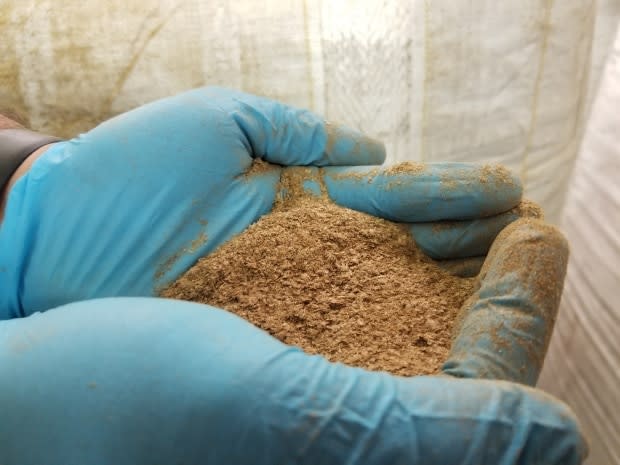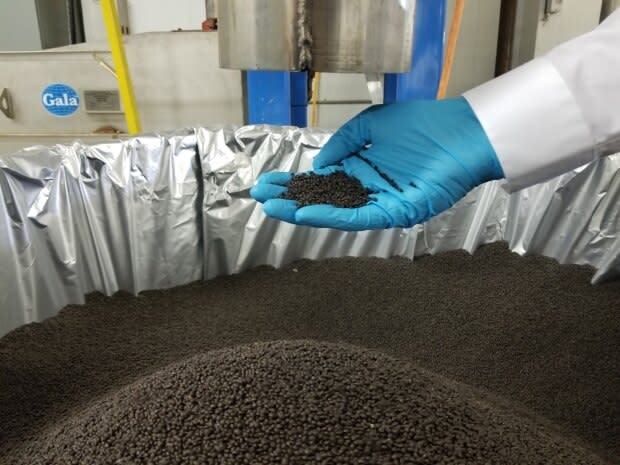Leamington, Ont. envirotech company helps create car parts from coffee waste
A Leamington, Ont. envirotech company is using a patented process to create resin for car parts from used coffee beans.
Instead of relying on traditional processes to create resins and polymers, however, Competitive Green Technologies uses coffee chaff — dried coffee bean skins that are removed during roasting — to create tiny, odourless biocarbon pellets that can be moulded to form a variety of different car parts.
As an example, Competitive Green Technologies president Michael Tiessen said the pellets can be moulded into headlight liners for some Lincoln vehicles.
"But it could be used for any other car parts which currently [use] a talc-filled polypropylene," he said.
Tiessen said that his company sources its coffee chaff from suppliers in Ancaster, Ont. and Oakville, Ont.

In addition to a partnership with McDonald's, Tiessen said his company also supply chain agreements with Starbucks, Tim Hortons and Club Coffee.
"These supplies come to us on a weekly basis in semi-load quantities," he said, adding that Competitive Green Technologies receives approximately 30,000 to 40,000 pounds-per-shipment.
Coffee chaff-made car parts help reduce emissions, says auto parts supplier
The technology to produce the resin was developed by researchers at the University of Guelph, who were able to develop a proprietary process to turn coffee waste into usable biocarbon.
Tiessen said that his company's material is 17 per cent lighter than the resins currently used in the auto parts industry, which ultimately translates into fuel savings for consumers and reduces carbon emissions all around.
Plymouth, Mich.-based auto parts supplier Varroc Lighting System develops exterior lighting parts at facilities around the world and counts Ford as one of their automotive industry partners.
Scott Montesi, vice president of the Americas Business Unit at Varroc, said the weight of the resin developed by Competitive Green Technologies' coffee chaff resin is one of the product's greatest benefits.

"We are able to mould this into the housing for our lights, we're able to take some weight out of each one of those components — roughly 15 to 18 per cent of each one of those components — and that helps … to lightweight the entire vehicle," he said.
"[It helps] … basically to reduce overall emissions in the vehicle," making it light weight.
According to Montesi, the cost of using resins made from typical processes is roughly the same as the cost of using the resin manufactured by Competitive Green Technologies.
"This is an opportunity to provide some benefits to the car essentially at a similar cost," he said.

At the same time, Montesi explained that his company is able to use the same moulding equipment with the coffee chaff resin.
"So the benefit of doing this for us on the manufacturing side is it really is truly a drop-in replacement for the same kind of processes we've done in the past," he said.
As a limitation, however, Tiessen said that parts made from his company's resin are currently only available in black.
"Currently, all products that are black are using carbon black," he said. "Carbon black is made from oil …. And we are cost-competitive with carbon black to achieve the same colouring benefits as carbon black with our biocarbon."
Any waste diverted from landfills is a good thing, says Windsor city official
Anne-Marie Albidone, manager of environmental services for the City of Windsor, said she supports companies that are taking steps to divert waste from landfills.
"Anytime we can divert anything from landfills, we consider that a good move," she said. "Whether it's a small amount or a large amount, in the end, even if it's a small amount, a bunch of small amounts will amount to one big amount."
Albidone explained that the City of Windsor's diverts approximately 40 per cent of waste from landfills through the city's recycling and yard waste programs.

She added that Windsor is approximately five or six years away from being able to implement an organics collection program.
"We are working toward that," she said. "But any time these companies come around and can do that kind of thing, even on a one-item scale, is always helpful."


